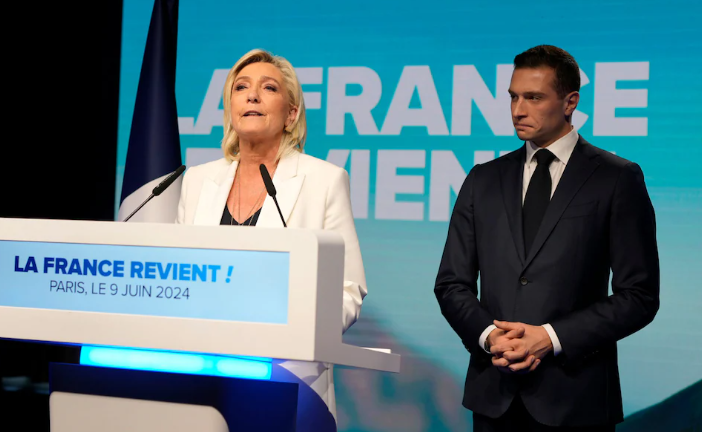After his party was humiliated in the European parliament elections over the weekend, French President Emmanuel Macron announced a snap parliamentary election on June 30 and July 7.
Marine Le Pen’s hard right National Rally party received 31.5pc of the French vote in the European elections, more than double the share of the vote won by Macron’s Renaissance party, at 15.2pc.
Investors are worried that Macron’s snap election will open the door for Le Pen to seize control of the French National Assembly, the country’s parliament.
The snap election will not threaten Macron’s position as president, but offers a clear route for Le Pen’s party to assume the office of prime minister. That would hand her party control of domestic policy and, crucially, tax and spending.
“They will effectively control fiscal policy,” says Simon Wells, chief European economist at HSBC.
Her party has already let it be known that Jordan Bardella, 28, who ran RN’s European election campaign and won 31.5 per cent of the vote – more than twice that of Macron’s party – would become prime minister should the party secure a majority next month.
“I knew this option was on the table, but when it becomes reality it’s something else … I didn’t sleep last night,” said the source.
Macron’s surprise move came after mainstream centrist parties kept an overall majority in the European Parliament in Sunday’s elections, but the hard-Right also notched up a string of high-profile victories in Italy and Austria.
It came second in the Netherlands and Germany, where the three governing coalition parties also tanked. However, centre-Left Chancellor Olaf Scholz’s spokesman ruled out a snap vote in Germany.
Some commentators are calling Mr Macron’s move rash or even political suicide prompted by hubris and a sense of “après moi, le déluge”.
The prospect that France will have a populist Right-wing prime minister when it stages the Olympics this summer is now real. Paris mayor Anne Hidalgo, a Socialist, described the prospect of elections just weeks before the start of the Paris Games as “extremely unsettling”.
“By playing with fire, the head of state could end up … burning himself and dragging the entire country into the fire,” Le Monde wrote in an editorial.
A poll discreetly conducted by the conservative Republicans party late last year suggested Rassemblement National (RN) would win the most seats in parliament – between 243 and 305, compared with 89 at present. It would require 289 seats for a majority.
The Kremlin, which hopes the far Right will take a softer line on Russia over its invasion of Ukraine, said it was “attentively observing” the gains across Europe.
Paris relies on debt investors to fund the budget deficit and analysts had already sounded the alarm about how sustainable this was even before the European election results.
S&P Global last week downgraded France’s long-term sovereign debt rating from AA to AA-, while Scope Ratings warned in April that Macron risked a “confidence crisis” in markets if he did not put forward a credible plan to get public finances back on track.
A less Europhile government would also likely have less regard for European fiscal rules than the current administration, says Wells.
“We might end up with games of chicken between the French government and the European Commission.”
He adds: “If a government comes in that is going to loosen fiscal policy considerably further, that could unravel markets further and see French interest rates rise potentially quite rapidly.
“In some sense, there’s a risk of a similar situation to what happened in the UK at the back end of 2022,” says Wells, referencing the market fallout from the mini-Budget.
Fears of France’s own Liz Truss moment are already worrying investors.
The French stock market slumped by 2.17pc on Monday and government bond yields surged to their highest level so far this year.



















